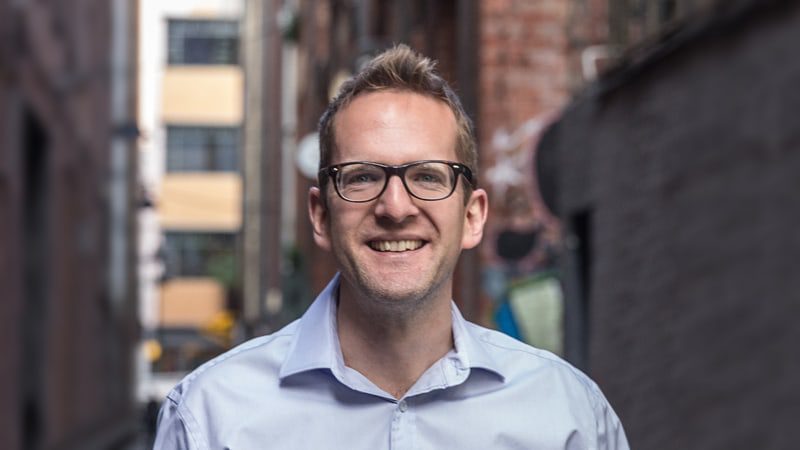With sustainable tourism fast climbing the travel and tourism agenda, we’re discussing the topic with travel industry leaders and change makers and asking them how they think we can #Traveltochangetheworld.
In our latest ‘Travel to change the world’ interview, James Thornton of Intrepid shares his thoughts and ideas on how we can all do our bit to sustain the industry and leave a legacy of goodness.
What was it that inspired you to join the travel industry?
My background was in investment management and I was basically working crazy long days wearing a suit. Basically, my purpose in life was to make rich people richer, and I decided that kind of existence was not a great way to spend the next 40 years of my life.
I wanted to do something I was really passionate about and I’m really passionate about two things in life – one is sport and one is travel.
I wasn’t good enough to play for a football team so I looked at the travel industry. If I was going to work in the travel industry, I wanted to work for a business that was true to its values so I looked around and found Intrepid. I’d never done a small group tour before but I joined in 2005 and never looked back.
It was my first job in the travel industry but I’ve been there for 12 years now.
What concerns you about the industry today in terms of its long-term viability?
In my 12 years in the industry, tourism seems to be growing not just really quickly but globally. If it’s not managed well, then that growth is going to put pressure on the environment and also the communities that get impacted by travel.
Nowadays even big cities like Barcelona and definitely Venice are dealing with major impacts of tourism.
The cruise industry is one where if you have unmanaged growth, it can have huge social and environmental impacts on a destination. 300 people suddenly rocking up to a town for a few hours is not always a positive experience for people and place.
That was a bit of a motivator for us to launch adventure cruising last year through our Peregrine brand. We wanted to offer a more sustainable alternative for travellers that enjoy cruises but are also conscious of the environment.
Do you think travel can change the world?

Last year, Intrepid Travel partnered with ActionAid to help lead the way for women’s land rights in Africa. ActionAid has been working with women farmers in rural Africa, to help them seek justice and fight for the basic rights they deserve to give their families a chance for a secure future.
Our vision at Intrepid is to change the way people see the world. Travel helps shape who we are and connects us with each other. I think it transcends intolerance, bigotry and prejudice.
Helping individuals evolve by encouraging tolerance, kindness, compassion, open-mindedness – that’s how travel can help change the way people see the world and hopefully each other.
In the current climate, the approach of thinking travel can change the world is perhaps more important than ever before.
It’s important to think globally when it comes to people’s values – something like elephant riding or buying ivory is acceptable in some Asian countries but it doesn’t necessarily make it right, does it?
Being aware of the treatment of girls, standing up to sexual harassment no matter where you are and being respectful of cultural norms like dressing appropriately when you go to visit temples – these are all key parts of how the travel industry is changing the way people see the world.
Are you seeing positive changes that you really admire?
The United Nations Year of Sustainable Tourism for Development puts sustainability at top of many tourism business agendas with a range of new initiatives and developments contributing to reaching its goals.
Then there are the recent advancements in green technology in the aviation industry. Aviation has had a really rough go of it but the green technology they are working on is a good thing.
Another positive is the growing demand for responsible travel experiences among travellers, in part due to the rise of blogs, Instagram feeds, Facebook and Twitter – travellers really sharing all of their experiences. It’s not always about getting a photo at the Eiffel Tower, it’s about having really cool sustainable experiences on the ground – discovering a cool café, trying a local bakery.
What projects is Intrepid undertaking in this space?
One of reasons we took the company back into private ownership 18 months ago was because we wanted the business to have a purpose beyond profit – that’s pretty integral to what we do.
It really starts from everything we do on the ground – we employ local leaders, use local transport, eat at local restaurants to help boost local economies. We really focus on changing the perspective of how people travel and trying to make them question their impact on the destination.
We were the first company to ban elephants rides on our tours. Through our partnership with World Animal Protection, we really uncovered the detrimental impact those rides have on elephants.
Then there’s our partnership with ReThink Orphanages – a not-for-profit finding better models of care for children rather than supporting orphanages per se.
That’s one of our main focuses this year – raising awareness about the detrimental effect orphanages can have both on a place but also as part of our commitment to child protection.
We fundamentally want to educate travellers that their decisions matter when they’re in a destination.
What do you think is the biggest challenge the industry faces in terms of the issue of ’sustaining’ itself?
The big test for the industry is managing short-term profitability versus the long-term need to grow sustainably.
That’s something we learned working with a FTSE 100-listed business. Profit is at the forefront of what they do and it’s not necessarily about long-term sustainable growth.
It’s important that destinations try to diversify their product offering to compete in a competitive market but also work on how they can develop responsibly rather than just always dropping prices for example.
Some of the biggest challenges will be around the preservation and protection of countries’ natural and cultural assets – without which there won’t be much of a tourism product in future.
Australia and the Great Barrier Reef is a classic example of that. It’s really important we sustain healthy industries and healthy communities so travellers can go and visit them.







